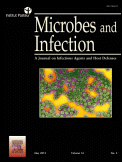
MICROBES AND INFECTION
Scope & Guideline
Advancing the Frontiers of Microbial Science
Introduction
Aims and Scopes
- Host-Pathogen Interactions:
Research focusing on the complex dynamics between pathogens and their hosts, including cellular and molecular mechanisms that facilitate infection and immune response. - Microbiome Studies:
Exploration of the role of the microbiome in health and disease, particularly how microbial communities influence susceptibility to infections and disease outcomes. - Innovative Diagnostic and Therapeutic Approaches:
Development and evaluation of novel diagnostic methods and therapeutic strategies, including vaccine development, antimicrobial agents, and host-targeted therapies. - Systems Biology and Omics Technologies:
Utilization of advanced technologies such as genomics, proteomics, and metabolomics to understand microbial behavior and host responses at a systems level. - Infectious Disease Epidemiology:
Analysis of the epidemiology of infectious diseases, including studies on transmission dynamics, outbreak investigations, and public health implications.
Trending and Emerging
- Impact of Microbiome on Infectious Diseases:
There is a growing body of work investigating how microbiota composition affects host susceptibility to infections, influencing treatment outcomes and disease severity. - Vaccinology and Immune Response:
Research on vaccine development, systems vaccinology, and the immune response to pathogens, particularly in the context of COVID-19, has surged, highlighting the urgency of effective vaccines. - Single-Cell Technologies in Pathogen Research:
The application of single-cell genomics and transcriptomics to dissect host-pathogen interactions at an unprecedented resolution is increasingly prominent. - Emerging Infectious Diseases and Zoonoses:
Studies focusing on emerging infectious diseases, particularly zoonotic pathogens, are on the rise, driven by global health concerns and ecological changes. - Advanced Therapeutic Approaches:
Research into novel therapeutics, including the use of nanoparticles, bioactives, and microbiome-based interventions, is gaining traction as a means to combat resistant infections.
Declining or Waning
- Traditional Antibiotic Resistance Studies:
Research on antibiotic resistance mechanisms has become less frequent, possibly due to a shift towards exploring alternative therapies and novel antimicrobial agents. - Historical Analysis of Infectious Diseases:
The publication of historical analyses related to infectious diseases has waned, as current research tends to focus more on contemporary issues and emerging pathogens. - Basic Virology Studies:
While still important, the basic studies of viral mechanisms without direct application to therapeutics or diagnostics are less represented in recent publications. - Animal Models in Infectious Disease Research:
The use of traditional animal models for studying infectious diseases appears to be declining, with a growing preference for in vitro studies and humanized models. - Localized Infectious Disease Studies:
Research focusing on localized or region-specific infectious diseases has decreased, reflecting a trend towards global health perspectives and broader epidemiological studies.
Similar Journals
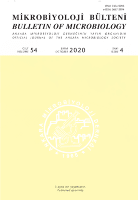
MIKROBIYOLOJI BULTENI
Connecting Researchers in Microbiology and Infectious DiseasesMIKROBIYOLOJI BULTENI, with ISSN 0374-9096, is a prestigious academic journal published by the ANKARA MICROBIOLOGY SOC, located in Ankara, Turkey. Established in 1973, this journal has been a vital conduit for disseminating research in the fields of Immunology, Microbiology, and Infectious Diseases, garnering a reputation as a significant contributor to the scientific community. The journal is currently ranked in the Q3 category within Immunology and Microbiology (miscellaneous), and Infectious Diseases, indicating its impactful presence amidst contemporary research. With access options that may be restricted, MIKROBIYOLOJI BULTENI actively welcomes submissions that advance the understanding of critical microbiological principles and practices, thereby supporting both national and international research efforts. Researchers, professionals, and students are encouraged to explore the latest findings shared in this journal, as it continually shapes the landscape of microbiology and infectious disease studies through its comprehensive and rigorous peer-reviewed publications.

EPIDEMIOLOGIE MIKROBIOLOGIE IMUNOLOGIE
Pioneering Studies in Microbiology and Public HealthEPIDEMIOLOGIE MIKROBIOLOGIE IMUNOLOGIE is a prominent scholarly journal published by CESKA LEKARSKA SPOLECNOST J EV PURKYNE in the Czech Republic. With an ISSN of 1210-7913, this journal has been at the forefront of research since its inception in 1994, showcasing a rich repository of studies bridging the domains of epidemiology, microbiology, immunology, and infectious diseases, and reflecting advancements over three decades. Although it currently falls within the Q4 category in multiple fields including Epidemiology and Microbiology, the journal serves an essential role in disseminating knowledge and fostering discussions around public health challenges. The contributions made through its pages are vital for researchers, healthcare professionals, and students aiming to enhance their understanding of complex biomedical issues. While it does not offer open access, the journal remains a critical resource in its niches, inviting readers to engage with the latest findings and methodologies reshaping the landscape of health science.

Emerging Microbes & Infections
Elevating global health through open access research.Emerging Microbes & Infections is a premier open access journal, published by Taylor & Francis Ltd since 2012, dedicated to advancing the understanding of microbial infections and their implications in human health. With an impressive Q1 ranking across multiple categories—including Drug Discovery, Epidemiology, Immunology, and Infectious Diseases—this journal is at the forefront of research in the microbiological sciences. Covering a diverse range of topics, it serves as a vital resource for researchers, healthcare professionals, and students alike. The journal's commitment to open access ensures worldwide dissemination of cutting-edge findings, fostering collaboration and innovation in tackling challenges posed by emerging infections. As part of the thriving academic community in the United Kingdom, Emerging Microbes & Infections plays a crucial role in shaping the future of infectious disease research and public health.

Current Clinical Microbiology Reports
Elevating Standards in Infectious Disease ResearchCurrent Clinical Microbiology Reports, published by Springer, is a leading international journal dedicated to advancing the field of clinical microbiology. With a focus on the diagnosis, treatment, and prevention of infectious diseases, this journal serves as a vital resource for researchers, medical professionals, and students engaged in microbiological studies. As a testament to its quality and influence, it holds an impressive impact factor and ranks in the Q1 category in both Infectious Diseases and Microbiology (medical), reflecting its prominent standing in the scholarly community. Additionally, it features a commendable Scopus ranking, placing it in the 77th percentile for Medicine - Infectious Diseases and the 69th percentile for Medicine - Microbiology (medical). With contributions spanning over a decade, from 2014 to 2024, the journal continues to publish high-quality research articles that shape the future of clinical practices and public health policies. While access options are variable, the journal's commitment to open dialogue and dissemination of knowledge makes it a pivotal platform for those passionate about tackling microbial challenges in healthcare.
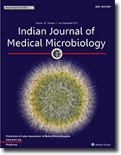
Indian Journal of Medical Microbiology
Connecting Global Scholars in Microbiology and Infectious DiseasesIndian Journal of Medical Microbiology, published by Elsevier, is a pivotal peer-reviewed journal dedicated to the field of medical microbiology, providing a vital platform for research and scholarship since its inception in 1986. With an Open Access model established in 2001, it ensures the dissemination of scientific knowledge to a global audience, enhancing accessibility for researchers, professionals, and students alike. The journal's scope spans critical areas including immunology, infectious diseases, and microbiology, with an impressive trajectory marked by converged years of publication allowing for a comprehensive exploration of evolving scientific trends. As of 2023, the journal holds a Q3 ranking in Infectious Diseases and Microbiology (medical) and a Q4 ranking in Immunology and Microbiology categories, reflecting its significant yet growing impact in the field. Researchers seeking to contribute to or stay updated on the latest advancements in medical microbiology will find the Indian Journal of Medical Microbiology a valuable resource, as it consistently bridges the gap between emerging science and clinical application.

MEDICAL MICROBIOLOGY AND IMMUNOLOGY
Pioneering discoveries in the realms of microbiology and immunology.Medical Microbiology and Immunology is a renowned journal published by Springer, serving as a pivotal resource in the fields of microbiology and immunology. Established in 1971 and continuing its legacy through 2024, this journal features cutting-edge research and reviews that address critical advancements and challenges within these dynamic fields. With an impressive impact factor and a robust ranking, including Q1 categories in both Microbiology (medical) and Immunology, it stands at the forefront of scholarly communication, ranking 21st out of 140 in the realm of Medical Microbiology. Researchers and professionals are encouraged to explore a variety of studies that delve into the interactions between microorganisms and the immune system, making it an essential resource for anyone fascinated by these interconnected realms of health sciences. Although not open access, the journal is widely accessible through institutional libraries, ensuring that significant findings reach a global audience. The University of New York Plaza serves as its operational hub in the USA, reinforcing its international influence and dedication to advancing knowledge in microbiology and immunology.
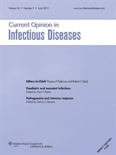
CURRENT OPINION IN INFECTIOUS DISEASES
Fostering Critical Discussions in Infectious Disease TrendsCURRENT OPINION IN INFECTIOUS DISEASES, published by Lippincott Williams & Wilkins, is a premier journal that focuses on the latest developments and understanding in the field of infectious diseases. With its ISSN 0951-7375 and E-ISSN 1473-6527, this journal has gained recognition for its pivotal role in advancing knowledge from 1988 to its current publications in 2024. Boasting an impressive Q1 ranking in both Infectious Diseases and the Medical Microbiology category, it holds a reputable position among the top journals in the field. The journal serves as an essential resource for researchers, professionals, and students alike, providing them with timely reviews, analyses, and perspectives that shape contemporary practice and policy. While lacking open access options, it ensures a critical examination of emerging trends and unique insights that foster informed discussions. With its consistently high impact factor, CURRENT OPINION IN INFECTIOUS DISEASES remains a vital platform for thought leaders and innovators navigating the complexities of infectious disease research.

Mediterranean Journal of Infection Microbes and Antimicrobials
Bridging gaps in understanding infectious diseases.Mediterranean Journal of Infection Microbes and Antimicrobials is a distinguished open-access journal published by GALENOS PUBL HOUSE, dedicated to advancing the understanding of infectious diseases and microbiology. Since its inception in 2011, this journal has been a vital resource for researchers, professionals, and students interested in the intricate world of microbes and their impacts on human health. With its ISSN 2147-673X, the journal has progressively gained visibility, although it currently holds a Q4 ranking in multiple categories including Immunology and Microbiology, and Infectious Diseases for the year 2023. The journal operates from its headquarters in Istanbul, Turkey, and features a rich array of articles that contribute to the field’s body of knowledge. As a platform enhancing the accessibility of research, it invites submissions from global contributors to foster collaboration and innovation in tackling microbial challenges.

INFECTION AND IMMUNITY
Transforming Knowledge into Public Health SolutionsINFECTION AND IMMUNITY is a distinguished peer-reviewed journal published by the American Society for Microbiology, focusing on groundbreaking research in the fields of infection, immunology, microbiology, and parasitology. Established in 1971, this journal has built a robust legacy, converging years of scientific discovery with a vision towards 2024 and beyond. With an impressive Impact Factor, the journal holds significant rankings in various categories; its Q1 status in both Infectious Diseases and Parasitology underscores its high relevance and quality within the scientific community. Researchers and professionals alike will benefit from its content, as it promotes the latest advances in understanding immune responses and infectious agents, further legitimizing its place among the top quartiles of its respective fields. Access options are provided through traditional subscription models, ensuring a broad charitable dissemination of knowledge. As a pivotal resource for scholars and practitioners alike, INFECTION AND IMMUNITY stands at the forefront of microbiological and immunological research, fostering essential discourse that is crucial for advancing public health and scientific insight.
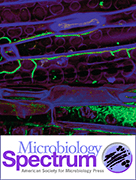
Microbiology Spectrum
Bridging disciplines in the realm of microbiological studies.Microbiology Spectrum is a prominent peer-reviewed journal published by the American Society for Microbiology, dedicated to advancing the field of microbiology through the dissemination of high-quality research. Since its inception in 2013 and continuing until 2024, the journal has established a strong presence in key domains such as microbiology, immunology, cell biology, and ecology, achieving impressive quartile rankings including Q1 in Infectious Diseases and Q1 in Immunology and Microbiology as of 2023. With an emphasis on open access to its scholarly content, Microbiology Spectrum aims to foster collaboration and knowledge sharing among researchers, professionals, and students alike. The journal's scope encompasses a diverse range of topics pertinent to the field, making it an essential resource for anyone involved in microbiological research and its applications. Researchers looking to publish their findings in a respected journal will find Microbiology Spectrum's robust impact factor and Scopus rankings serve as testament to its significance and influence within the academic community.